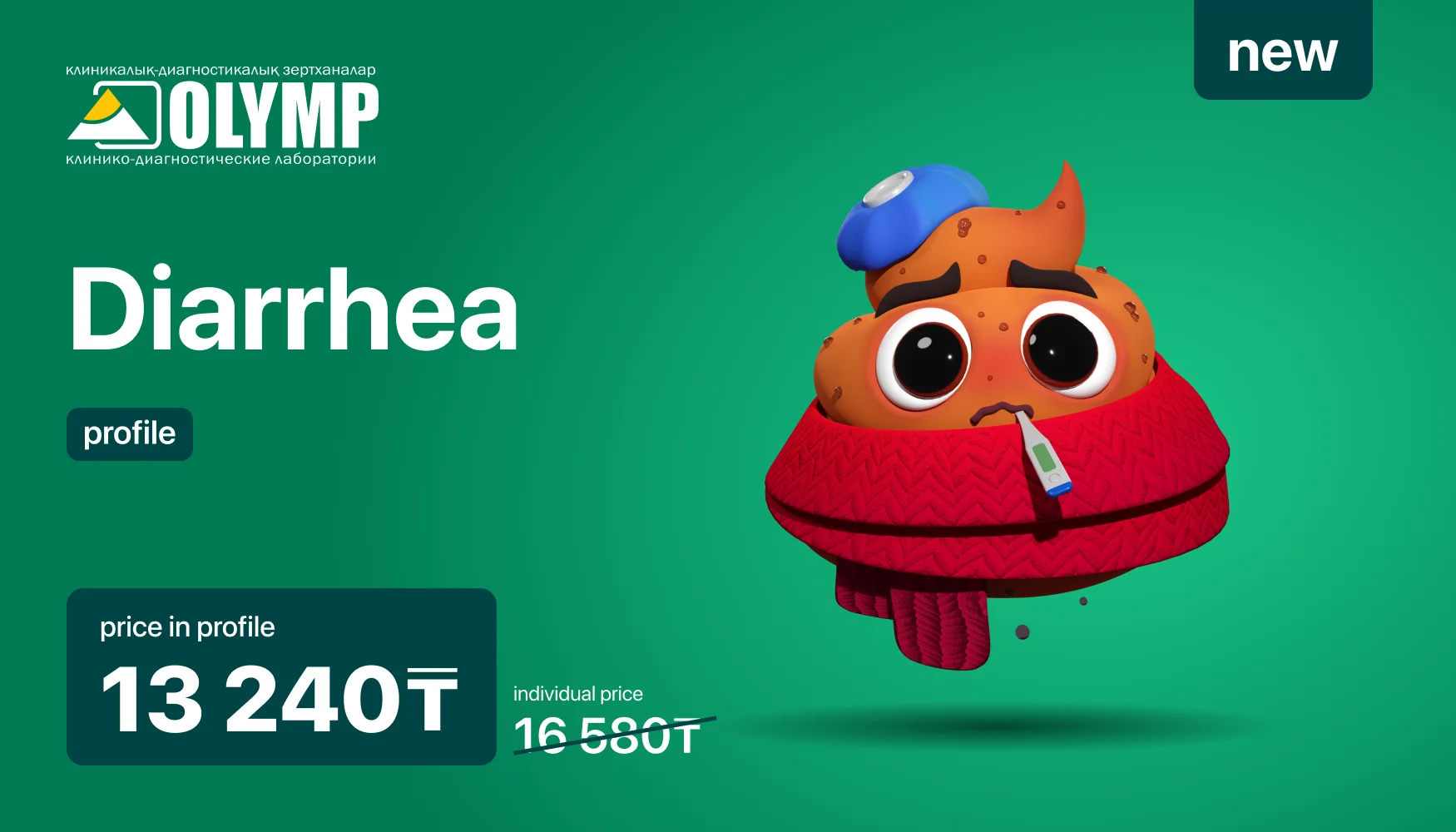Back
From01.02.2024To31.12.2024
4 daysleft

New! Profile “Diarrhea”
13,240 ₸ Instead16,580 ₸
Sometimes we overlook minor changes in our well-being and go to the doctor only if serious symptoms appear.
To avoid this, the “Diarrhea” profile is now available in the OLYMP CDL
Diarrhea is a condition in which a person has excessive and frequent bowel emptying, usually with liquid or watery stools. It can be caused by a variety of reasons including infections, viruses, bacteria, parasites, food allergies, stress, certain medications, or food poisoning.
Tests included in the “Diarrhea” profile:
- Examination of feces for protozoa and helminths by manual method
- Determination of Giardia antigen in feces
- Detection of hidden blood in the stool is qualitative by manual method
- Stool analysis (stool test) is a general clinical manual method
- Rotavirus antigen in feces by ELISA method
- Stool culture on pathogenic microflora with defining of antibiotic sensitivity
- Fecal examination for protozoa and helminths by manual method is a procedure in which a fecal sample is examined to identify the presence of parasites
- Determining of Giardia antigen in feces is a laboratory method aimed at detecting the presence of antigens that are characteristic of the Giardia parasite in a stool sample. This test is usually used to diagnose giardiasis, which is caused by these parasites and manifests itself with symptoms such as diarrhea, stomach aches
Price separately: 16,580 tg.
The price in the profile: 13,240 tg.
- The detection of hidden blood in feces by a qualitative manual method is a laboratory procedure that aims to identify traces of blood in a stool sample that are not visible to the unaided eye. This test can be used for early diagnosis of various diseases of the gastrointestinal tract, such as ulcers, and polyps. Detecting hidden blood can help identify problems when other symptoms have not yet manifested.
- Fecal examination (stool test) by the general clinical manual method is a laboratory analysis that analyzes various physical, chemical, and microbiological parameters of a fecal sample. The purpose of the stool test is to assess the state of the digestive system's function, detect possible pathologies, and evaluate the effectiveness of treatment for diseases of the gastrointestinal tract.
- Rotavirus antigen in feces by the ELISA method is a laboratory procedure aimed at detecting the presence of antigens characteristic of rotavirus in a feces sample using an immunoenzyme method. Rotaviruses are one of the most common viruses that cause acute intestinal infection, especially in children. Detection of rotavirus antigen in feces by ELISA can be used to diagnose rotavirus infection and determine the cause of acute diarrhea in patients.
- Stool culture on pathogenic microflora with determination of antibiotic sensitivity is a laboratory analysis of human feces, which is carried out by placing biomaterial in a nutrient medium to determine the quantity of a set of pathogenic microorganisms in the intestine. Fecal test for the “dysgroup" implies the detection of the following pathogens: Salmonella, Shigella spp., Yersinia spp., and diarrheal E.coli 4. These pathogens can not only cause intestinal disorders but also be asymptomatic, thereby turning a person into a source of infection that can infect people around them.
Cities with a profile "Diarrhea":
- Astana
- Almaty
- Shymkent
- Almaty region
- Atyrau
- Taraz
- Qaragandy
- Pavlodar
- Turkistan
- Zhezkazgan